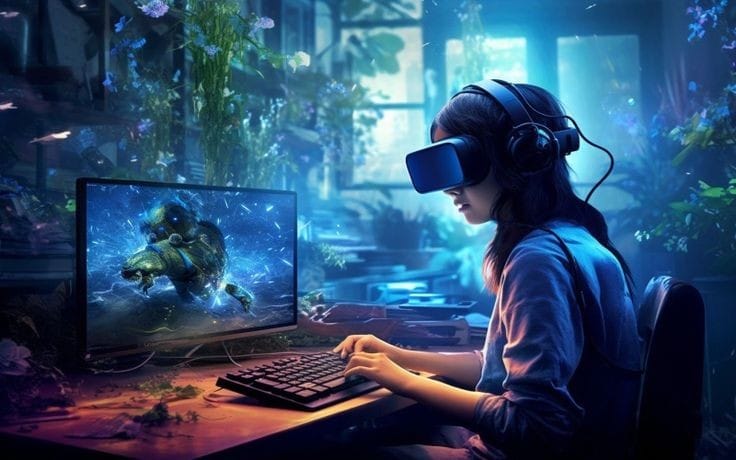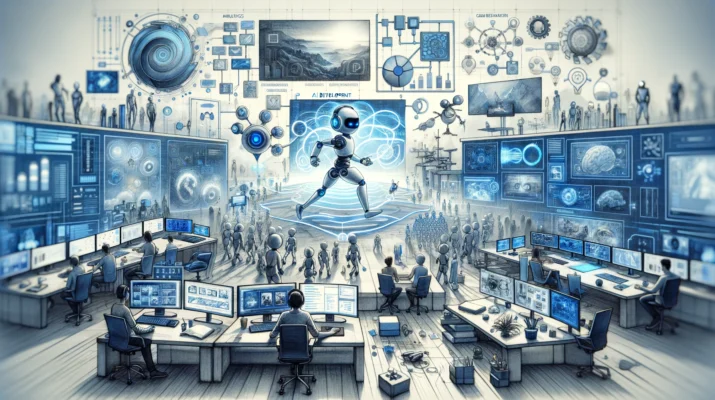The rapid evolution of artificial intelligence (AI) is transforming the video game industry in groundbreaking ways. From smarter game worlds to streamlined development processes, AI is making games more dynamic, immersive, and personalized. As we enter 2024, game developers are increasingly turning to AI to enhance gameplay experiences and optimize production. This article explores the powerful impact AI is having on the world of video game development and what it means for the future of gaming.

Transforming Game Design with Intelligent NPCs
AI technology has revolutionized how non-playable characters (NPCs) behave, allowing them to respond to player actions in real time. Traditionally, NPCs followed pre-programmed behaviors, but in 2024, AI-driven characters can now adapt, evolve, and interact in more lifelike ways. These smarter NPCs create more engaging, realistic environments, especially in open-world games where player choices impact the game world in real time.
AI-powered procedural content generation (PCG) is also making waves in game design. Machine learning algorithms can create expansive landscapes, unique textures, and intricate details, resulting in worlds that feel organic and unpredictable. This approach not only enriches the player experience but also reduces the time required to design massive game worlds.
Personalizing Gameplay for Every Player
AI’s ability to analyze player data in real time allows developers to tailor the gaming experience to individual play styles. Adaptive difficulty settings are one example, adjusting challenges based on each player’s skill level, making games accessible and engaging for everyone.
In addition to difficulty scaling, AI can personalize storylines and interactions, enabling players to feel deeply connected to their in-game choices. By adjusting dialogue and story events to suit player decisions, AI creates immersive narratives that feel unique to each user, enhancing the overall gaming experience.
Enhancing Realism with Advanced AI Graphics
Graphics and animation have reached new heights with the help of AI. In 2024, AI-driven rendering tools allow for lifelike textures, lighting, and environmental details. Machine learning models simulate complex lighting effects, adding depth to game environments and creating more visually impressive worlds.
Character animation is also more realistic than ever, with AI-based systems learning from real-world movements to create authentic animations. AI upscaling tools like NVIDIA’s DLSS (Deep Learning Super Sampling) enhance image quality, allowing for smoother performance on a wide range of hardware without sacrificing visual fidelity.
Streamlining Game Development Processes
AI tools are revolutionizing game production by automating repetitive tasks, such as asset creation and bug testing. AI algorithms can scan code for errors, predict potential issues, and even automate playtesting. This reduces the workload on developers and quality assurance teams, leading to shorter development cycles and more polished releases.
Automated content generation is another area where AI shines. By creating backgrounds, objects, and textures, AI allows developers to focus on more creative aspects, reducing production time and resource requirements, especially beneficial for indie studios with limited resources.
Elevating Storytelling with AI-Driven Narratives
The future of game storytelling is being reshaped by AI, enabling more interactive and adaptive narratives. In 2024, AI-powered narrative engines allow for branching storylines, creating unique story arcs based on player decisions. Natural language processing (NLP) advancements may soon lead to open-ended, conversational NPC interactions, enabling deeper and more meaningful player engagement.
The Future of AI in Gaming: Endless Possibilities
AI’s role in video game development is expected to expand significantly. Future AI-driven games may evolve continuously based on player input, providing endlessly fresh experiences. As AI becomes more accessible, indie developers will gain the ability to produce high-quality games, leading to greater diversity in game offerings and fresh ideas.
Conclusion
AI’s impact on video game development is transforming the industry in profound ways. From creating smarter NPCs and personalizing gameplay to enhancing graphics and streamlining production, AI is redefining what’s possible in gaming. As technology advances, the future of gaming holds immense potential for more immersive, dynamic, and personalized experiences, setting the stage for a new era in interactive entertainment.
